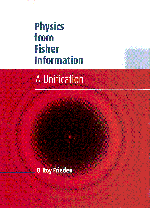
-
Select format
-
- Publisher:
- Cambridge University Press
- Publication date:
- January 2010
- December 1998
- ISBN:
- 9780511622670
- Dimensions:
- Weight & Pages:
- Dimensions:
- Weight & Pages:
You may already have access via personal or institutional login
Book description
This book defines and develops a unifying principle of physics, that of 'extreme physical information'. The information in question is, perhaps surprisingly, not Shannon or Boltzmann entropy but, rather, Fisher information, a simple concept little known to physicists. Both statistical and physical properties of Fisher information are developed. This information is shown to be a physical measure of disorder, sharing with entropy the property of monotonic change with time. The information concept is applied 'phenomenally' to derive most known physics, from statistical mechanics and thermodynamics to quantum mechanics, the Einstein field equations, and quantum gravity. Many new physical relations and concepts are developed, including new definitions of disorder, time and temperature. The information principle is based upon a new theory of measurement, one which incorporates the observer into the phenomenon that he/she observes. The 'request' for data creates the law that, ultimately, gives rise to the data. The observer creates his or her local reality.
Reviews
‘Frieden’s information-based methods provide a stunningly clear interpretation of the laws of physics … Unlocking the fundamental laws in impressive enough, but if this one principle really is the key to all physics, it should do more than reproduce what physicists already know. It should also reveal the secrets of unsolved mysteries.’
Robert Matthews Source: New Scientist
‘ … a tremendously interesting and original book … Frieden’s findings are intellectually satisfying on many levels. First is the recognition that J. A. Wheeler’s remark that ‘Observer participany gives rise to information; and information gives rise to physics’ is at the heart of the work. And second is the idea that in a game of information hoarding between the observer and Nature, Nature always wins or breaks even. And yet it is by playing this game (which ‘you can’t win’) that Frieden derives Maxwell’s equations, that Klein-Gordon equation, the Einstein field equation of general relativity, and several others. I shall not say more about this stimulating text here - I hope that I have said enough to goad you to look at it yourself.’
P. W. Hawkes Source: Ultramicroscopy 80
Contents
Metrics
Altmetric attention score
Full text views
Full text views help Loading metrics...
Loading metrics...
* Views captured on Cambridge Core between #date#. This data will be updated every 24 hours.
Usage data cannot currently be displayed.
Accessibility standard: Unknown
Why this information is here
This section outlines the accessibility features of this content - including support for screen readers, full keyboard navigation and high-contrast display options. This may not be relevant for you.
Accessibility Information
Accessibility compliance for the PDF of this book is currently unknown and may be updated in the future.


